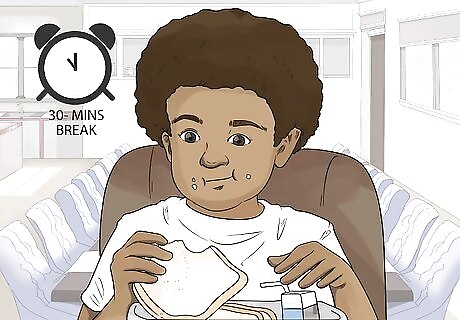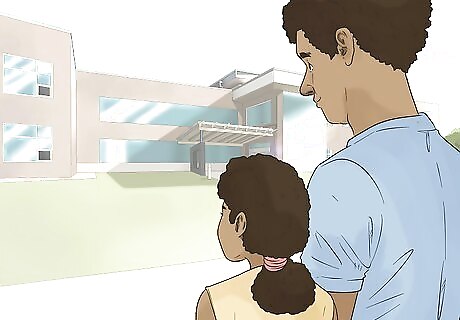
views
Learning About the Exam

Read over the exam procedures. It is good to know what material will be on the exam and how the exam will be structured. Knowing what your child will have to do will help you prepare them. You can consult the testing website, their class notes, or the school for more information regarding the exam. Some questions you may want to answer include: When is the exam? What is being tested? Is it multiple choice? Are there essays? Will the child have to show their work? How long is the exam? What supplies will they need (pencils, calculators, etc.)? Does the test accommodate certain learning differences?

Contact their teacher. Your child’s teacher will be able to provide the most up-to-date information regarding the exam. They will also be able to help you identify your child’s weak points so that you can help them study more effectively. Email the teacher to set up a conference. You might ask: How has my child been doing on their practice exams in class? How can I, as a parent, help my child? How long should my child be studying for this exam? What happens if my child does not pass?

Find a practice exam. If your child is taking a standardized test, you should be able to easily locate practice exams. These exams are often tests that were given in previous years. They can help your child learn not just what type of questions are on the exam but how the exam is structured and formatted. You can find these exams online on the examination’s website or through your child’s teacher. If your child is not taking a standardized test, a practice exam may not be available. Instead, consult their notes and textbooks to see what type of information might be on the exam. You can test them from this material. Some teachers provide a review guide before exams. You can use this to help your child study.

Consider hiring a tutor. If you are concerned about your ability to help your child study, you can hire a tutor. There are many tutors who specialize in different types of exam. You may also ask an older student who has already taken these exams. You can find a tutor by searching a childcare website or by contacting a local tutoring center.
Studying With Your Child

Schedule study times. At least two weeks before the exam, you should start scheduling regular periods in the evening to study. You may decide to have your child study for an hour every weekday and give them the weekend off, or they could devote an hour every other day. Organize a timetable for the period running up to exams. Mark when your child will study on each day. By encouraging a consistent schedule, they will form a healthy studying habit. If you are having difficulty filling an hour with studying, you might organize your sessions by task. For example, you might ask them to finish twenty math problems or write one essay. These tasks may take different lengths of time, but they will still help your child prepare.

Find a quiet place to study. Your child will need a quiet place where they can study undisturbed for their examination. There should be no distractions, such as TV, in the room. You should make it clear to other family members, such as younger siblings, that the child is not to be disturbed while they are studying. This will help your child’s concentration as they prepare. Good places to study include the child's bedroom or the kitchen. While the child is studying, minimize noise in your home. Keep the television volume low, and do not hold loud conversations. If you do not have a quiet place for your child to study, you might take them to a public library where they can do their work in peace.

Create study aids. It is important for your child to both memorize information and recall it on demand. To improve their memory, you can encourage certain studying practices. Using these aids on a daily basis will help them learn more efficiently than cramming the information from a book. Create a sheet of math formulas that they need to know. Have them memorize the formulas. Encourage them to write these formulas down in the margins of the test as soon as they receive it. Teach your child to go through reading passages and circle important details, such as the main character, purpose, and tone. Flash cards work well for learning vocabulary, science facts, and historical dates.

Practice answering questions. Ask your child questions that they might find on the exam. Develop questions based on their notes, flashcards, or textbooks. You can say these out loud or give them a written practice test. Note which problems your child is having the most difficulty with, and focus on those in your next study session. If you have a practice exam, give it to them a few days before the examination. Time them for the same length of time that they will be given on the test. If they are given breaks between sessions, give them the same type of break.

Take time out for regular breaks. Concentration weakens after a certain amount of time. A short break is a good idea every 30 to 60 minutes. During a ten to fifteen minute rest, your child can stretch, have a snack, or take a walk. These brief breaks can reduce stress, improve memory, and increase concentration.
Tackling Test Anxiety

Ask your child how they are feeling about the exam. Your child might be nervous, anxious, or scared about the exam. It is important to identify these feelings early so that you can support your child before the exam. Ask them, “How are you feeling about the upcoming exam?” If your child answers that they are worried about the exam, do not dismiss their feelings. Instead, ask them more questions, such as “What part of the exam are you most worried about?” or “Is there any particular reason why you’re so worried?” Reassure your child that the result does not matter as long as they tried their hardest. You can say, "It is natural to feel worried or anxious. What matters about the test is that you tried your best. If you don't pass, everything will still be ok." Your child might express some physical feelings of discomfort, such as nausea, butterflies in the stomach, sweating, or insomnia. During these episodes, support the child until they have calmed down. You might want to give them a break to let them think about something other than their exam.

Remind them that this exam does not define their self-worth. Your child may be worried that if they fail this exam they will have to repeat their grade or that they will be considered stupid. You should let your child know that one exam does not define who they are. You can say, “While it’s true the exam is important, it’s not the most important thing. No matter how you do on it, you’re still a wonderful, talented person. Remember that it does not define how smart you are or what a good person you are.”

Let the child pursue other activities. While you may want to encourage your child to do their best, you should not overwhelm the child. Do not focus exclusively on the exam in the weeks leading up to it. Instead, allow your child plenty of breaks to focus on their friends, hobbies, and other activities. You may only want to focus on the exam during their scheduled study time. When you do talk about the exam, be positive. Instead of warning your child about failing or what might happen if they don’t pass, assure them that they can pass. For example, instead of saying, “If you don’t study hard, you’ll fail this test and repeat the grade,” say, “It’s good to study so that you can do your best on the exam. You will feel so much better about taking the exam if you’re prepared.”

Teach your child relaxation techniques. Some children develop test anxiety. It is good to show your child how they can handle these periods of panic, especially if they happen in middle of exam. These practices can help calm your child down so that they can focus on the exam itself. You can show them how to: Take deep breaths. They may even want to count five deep inhalations and exhalations. Squeeze a stress ball. If they are allowed, send the ball into the exam with them. Smile. Smiling can help relax the body even when you aren’t feeling happy. Think positive thoughts. Give them a mantra, such as “You can do this” or “You’re awesome. You will ace this test,” that they can think as they take the test. Stretch during breaks.
Supporting Your Child on The Day of the Exam

Go to bed early the night before. Your child needs plenty of sleep before they take their exam. Make sure they get to bed on time the night before. They should have at least eight hours of sleep so that they are alert when taking their exam.

Give them a good breakfast. A breakfast with complex carbs and proteins will give your child the energy they need to concentrate on their exam. Make sure that they eat their breakfast the morning of the exam. Avoid sugary foods as these can cause the child to crash. Instead, you can feed them: Eggs Whole grain cereals or oatmeal Chia or flaxseed Smoked salmon lox

Double-check their supplies. Before they go out the door, look through their backpack. Make sure they have all of the necessary supplies for the examination. You may want to look for: Pencils Erasers Calculator Ruler Comfortable sweater

Ensure they arrive on time. Exams typically begin promptly at their scheduled time. Some examinations will not admit late arrivals while others will not let the child make up the missed time. Make sure your child arrives on time to school or the examination center. You may want to aim to arrive fifteen minutes early.



















Comments
0 comment